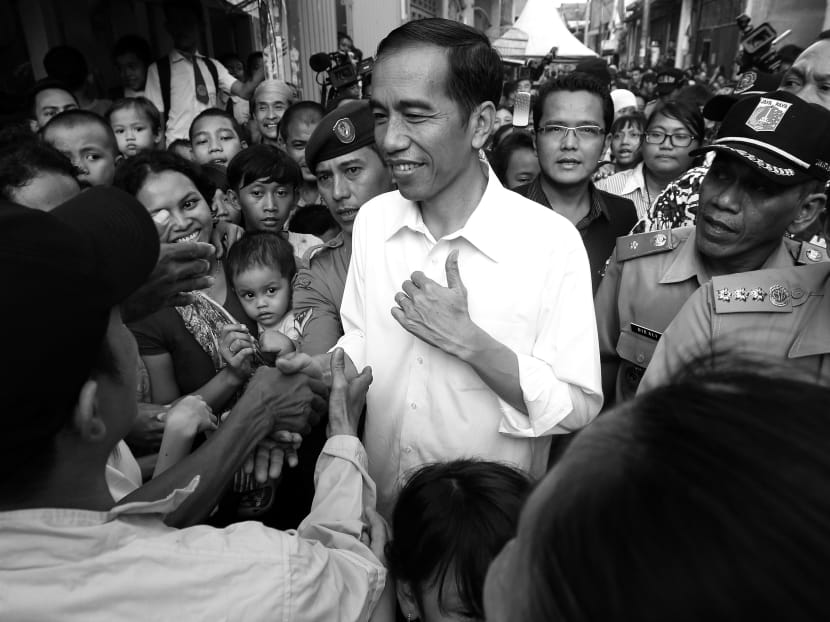Can Jokowi change Indonesia?
For many Indonesians, the wait is finally over. After months of speculation, Mr Joko Widodo (popularly known as Jokowi) has been named Indonesian Democratic Party-Struggle’s (PDI-P) presidential candidate. The announcement was made on March 14 by Ms Megawati Sukarnoputri, PDI-P’s Chairperson and former Indonesian President.

Famous for his ‘blusukan’ or unplanned visits, Jakarta’s Governor Joko Widodo immerses himself well at the grassroots and village levels. PHOTO: REUTERS
For many Indonesians, the wait is finally over. After months of speculation, Mr Joko Widodo (popularly known as Jokowi) has been named Indonesian Democratic Party-Struggle’s (PDI-P) presidential candidate. The announcement was made on March 14 by Ms Megawati Sukarnoputri, PDI-P’s Chairperson and former Indonesian President.
Many polls show Mr Widodo ahead of the other presidential hopefuls in the July presidential elections, which will be the third time since 2004 in which the President is directly elected by the people. The delay in the naming of Mr Widodo’s candidature was a tactical one: To prevent personal attacks on him and to build campaigning momentum closer to the election date. Ms Megawati failed to win in the 2004 and 2009 elections after being defeated by Dr Susilo Bambang Yudhoyono.
But Mr Widodo has one more hurdle to cross before qualifying as a presidential candidate. A party can elect a presidential candidate if it obtains 20 per cent of the 560 seats in the legislative assembly (DPR) or 25 per cent of the popular vote. Parties that fail to obtain the required number of seats or votes must form a coalition with other parties in order to name their presidential candidate.
Mr Widodo’s nomination, however, has boosted PDI-P’s chances of meeting this threshold. The Indo Barometer survey shows Mr Widodo’s electability as President is above 30 per cent, with his closest challenger, Mr Prabowo Subianto, scoring 17.4 per cent.
NEW LEADERSHIP STYLE
His popularity notwithstanding, can Mr Widodo alone transform Indonesia? Undisputedly, his leadership style can set a precedent for the way Indonesian politics will be conducted in the future. Famous for his “blusukan” or unplanned visits, Mr Widodo immerses himself well at the grassroots and village levels. In seeking solutions to problems, he bypasses the multiple layers of bureaucracy and red tape that are ubiquitous in the Jakarta administration.
Mr Widodo’s presence also brings a breath of fresh air into a country that has recently seen many corruption scandals involving top leaders. Furthermore, by not having a military background, he can utilise his clean record and people-centred image as an embodiment of social change.
However, experience from the past attests to the limitations in placing too much hope in only one man. A decade ago, similar hopes were cast on President Yudhoyono. His record of bringing economic and political stability notwithstanding, Dr Yudhoyono’s administration has been marred by numerous corruption scandals and abuse of power. His administration also oversees the decentralisation process, which has intensified since 2004.
Although this process has undoubtedly led to development in the countryside; it has also triggered many rent-seeking activities at the district level. Moreover, Dr Yudhoyono’s track record has been damaged by poor handling of religious tensions, particularly his failure to tackle the Ahmadiyah and Shia issues effectively. Not only has Dr Yudhoyono been too irresolute in clamping down on the religious extremist, he had in fact co-opted some religious conservatives as his advisers.
FROM PERSONALITY TO POLICIES
It takes more than one man to change Indonesia. Regrettably, the Indonesian political culture still underscores the personality factor as the essence of good governance. In fact, despite considerable excitement towards Mr Widodo’s election as Jakarta Governor in 2012, his track record in solving the problems of the capital city has been mixed. He has brought about much change in Jakarta, yet his handling of public transportation and flooding has generally been less successful.
For certain, managing Jakarta versus governing Indonesia entails different challenges, and needless to say, the latter challenges are more complex. Some have even questioned if Mr Widodo has what it takes to manage a nation of more than 250 million people and a land mass that stretches from Aceh to Papua.
While Mr Widodo has won the hearts of many Indonesians with his people’s touch, riding on the wave of populism has its limitations.
The time has come for Mr Widodo to clearly state the policies he stands for — both concerning domestic and foreign affairs.
In an example Singaporeans may be more familiar with, Mr Widodo, in May, through a Governor’s decision No 758, approved the renaming of Jalan Prapatan in central Jakarta to Jalan Prajurit KKO Usman-Harun, after Usman Hj Mohd Ali and Harun Said. Calling them national heroes shows he may not be familiar with international relations.
Indonesia’s naming of a warship after the two marines responsible for the bombing of Singapore’s MacDonald House in 1965 led to diplomatic tensions between the two countries recently.
Thus, a more pertinent question is not what kind of President Mr Widodo will be, rather the nature of the team he assembles if he is elected.
Let us leave the question of whether Mr Widodo can change Indonesia until we find out who his running mates are and what he really stands for.
ABOUT THE AUTHOR:
Norshahril Saat is a PhD candidate at the Department of Political and Social Change, Australian National University. He researches on Indonesian and Malaysian politics.






